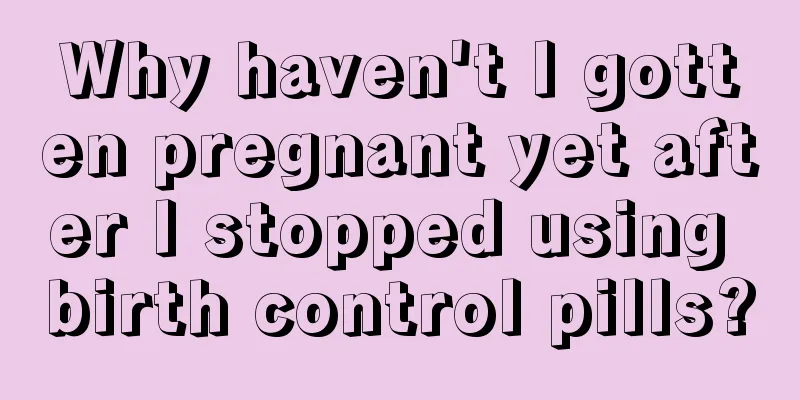Why haven't I gotten pregnant yet after I stopped using birth control pills?

|
The family's financial situation has improved, and the parents are planning to have a healthy baby. However, the mother has used birth control pills before, so why hasn't she gotten pregnant yet after stopping using them? Stop taking birth control pills and still not pregnantThe function of birth control pills is to inhibit ovulation. When ovulation is inhibited, pregnancy will not occur, thus achieving the contraceptive effect. Some people believe that if birth control pills are taken for a long time, they will become infertile in the future. In fact, this concept is wrong. It is usually no problem to get pregnant after stopping birth control pills.Doctors often treat infertility patients by first giving them an injection to suppress ovulation, and then giving them an injection to stimulate ovulation, which is more effective. Most people think that injections to suppress ovulation are expensive, so doctors prescribe birth control pills first, which have the same effect, and then stop taking the pills and then ovulate, so taking birth control pills will not cause infertility.However, if you really take it for a long time, the ovaries will be in a state of long-term suppression, and they may forget their own functions. However, after stopping the drug for a period of time, the original function of the ovaries will be restored. If it still doesn't work, as long as you use ovulation drugs to stimulate it, it will return to normal function. So there is no need to worry about future infertility problems after taking birth control pills. If you still can't get pregnant after a year, the couple should receive further diagnosis and treatment.Contraceptive Pill Side EffectsPoor appetite, nausea, vomiting, dizziness, weakness. Often occurs when starting to take the medicine. When this reaction occurs, on the one hand, you can drink some strong tea, chew some candied ginger, pickles; on the other hand, you must insist on taking the medicine as prescribed. As the body adapts to the medicine, the reaction will gradually disappear. Some women have more severe reactions, and they can take the following drugs to inhibit the reaction appropriately: vitamin B6, 20 mg each time, 3 times a day; vitamin C, 100 mg per second, 3 times a day; anti-reaction tablets, 1 tablet each time, 3 times a day; compound aluminum hydroxide tablets or yeast tablets, 1 gram each time, once a day, taken together with contraceptive pills.Increased and thin leucorrhea. This often occurs after taking long-acting contraceptives. Generally, no treatment is required. If the leucorrhea is excessive, a Chinese medicine tablet can be placed in the vagina every night to stop the discharge.Intermittent vaginal bleeding. This often occurs after missing a contraceptive pill. Generally, as long as you continue to take the pill on time, the bleeding will stop and your menstrual period will return to normal. Of course, you can also ask your doctor to adjust the medication or switch to other contraceptive pills. For example, if you bleed after taking contraceptive pill No. 2, you can switch to contraceptive pill No. 1.Menstruation is scanty or even absent. This condition does not have much impact on physical health and is often temporary. If there is amenorrhea for three consecutive months, the medication should be stopped and other contraceptive measures should be taken. The medication can be continued after the menstruation resumes on its own. If menstruation still does not come within one month after stopping the medication, the doctor should use drugs such as megestrol, compound progesterone or menstruation-inducing tablets to induce menstruation according to the examination results, and then other contraceptives should be used instead.If you have edema, you should take diuretics and low-salt food. If you have a significant and continuous increase in weight, you should stop taking the medicine and use other contraceptive methods.Yellow-brown spots appear on the face. They will generally disappear gradually after stopping the medication. If you take vitamin B or vitamin C, the effect will be better.Breast tenderness. Generally, the dosage can be reduced. If the condition is severe, you should consider stopping the medication and choosing other contraceptive measures.What happens if you take too many birth control pills?Contraceptive pills can reduce glucose tolerance and have a certain impact on sugar, protein and fat metabolism.Contraceptive pills can increase lipoprotein levels, leading to higher blood pressure and arteriosclerosis.Contraceptive pills are mainly powered by estrogen. High doses of estrogen can increase coagulation factors and increase the risk of thrombotic diseases.Contraceptive drugs can affect the excretion function of bile, and long-term use can also cause abnormal liver function. |
>>: Can I still have children if I have premature ovarian failure?
Recommend
Which country is Crest toothpaste from? Which is better, Crest toothpaste or Sensodyne?
Crest toothpaste is a brand we are all familiar w...
Can I have IVF if I have chromosomal abnormalities? Can I have children if I have chromosomal abnormalities?
Chromosomal abnormalities between husband and wif...
Where is the best place to travel in the summer of 2017? Where is the best place to travel in the summer of 2017?
Summer vacation is coming soon, and many parents ...
What should I do if my child likes to talk back? Why do children like to talk back?
Many parents have trouble educating their childre...
How to adjust the shoulder straps of a safety seat? The service life of a safety seat
We all know that a safety seat is a product used ...
What are the effects and functions of toothpaste when washing your face? Which brand of toothpaste is the best?
Toothpaste is a product that we all use every day...
How to improve the cold parent-child relationship when the child talks back
As children grow up, parents and children begin t...
What are the symptoms of premature labor?
There are many situations that women may encounte...
How to relieve the pain of teething baby and crying
When babies are 3 or 4 months old, their teeth wi...
Can eggs remove fetal toxins? How to remove fetal toxins with eggs
Fetal toxins are a kind of internal heat caused b...
Can I breastfeed while I have my period? Can I have my period while I am breastfeeding?
Breastfeeding during breastfeeding has become the...
Pregnancy nutrition recipes What to eat during pregnancy is good for the baby's brain development
Diet is very important for every pregnant woman d...
When should I start using a birthing ball? What are the functions of a birthing ball?
In order to relieve the pain of parturients, more...
What will happen if breast hyperplasia is not treated? Will breast hyperplasia become cancerous if it is not treated?
Breast hyperplasia is a common disease among wome...
How long does it take for the milk to stop flowing after a normal birth without breastfeeding?
For most mothers, they will breastfeed their babi...









